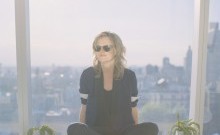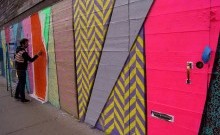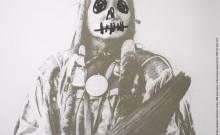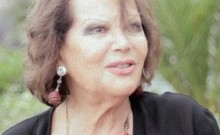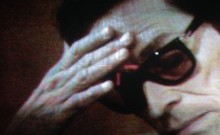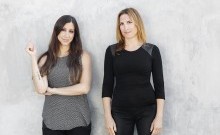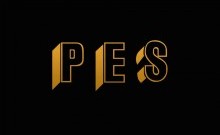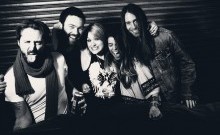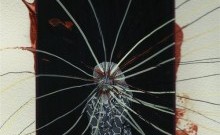Made in New Zealand
Trying to crack into the music industry can be a constant struggle, for an emerging musician, the process and procedures of the industry can be a hard one, and getting in front of the right people and getting a break is not as simple as one would think. We sat down with New Zealand’s newest EDM powerhouse Helen Corry to have a chat about the local industry, growing up on a farm, cracking the US Charts and making the decision to pack up and move to Melbourne.
She’s been rehearsing for her up and coming New Zealand summer tour with her band Helen Corry. It was a late night and we met up early the next morning.
Holly Dean: You must be knackered?
Helen Corry: It’s just one of those things, I’m just so lucky to call this my job, I love it, last night was the first time we’d played our new songs together live, and we were nailing it, there were loads of high five moments.
The band is based in both Australia and New Zealand, with Helen in Melbourne, and band members in Sydney and Wellington. “There’s lots of back and forth”.
Born Helen Patricia Corry in Rotorua, she was raised on a sheep and beef farm in Atiamuri, twenty minutes north of Taupo. Yes this girl can shear a sheep. The 26 year old redhead bomb shell (it must be the strong Irish roots) is the youngest of five. “I think being the youngest of five I had to get some attention, I think that’s where performance came in and my interest in music came about. I always loved language and was always writing poetry, I had a real need to express, I always had stories to tell, so it was the medium for me to do it”.
Helen had a classic kiwi upbringing, outdoors with a sense of adventure, filled with dares and running around barefoot. “I grew up on a farm, I’m a farm girl through and through. My parents were really supportive of all of us kids, they gave us lots of opportunities. For example, if we wanted to learn an instrument, my parents really let us find the instrument that stuck. I learnt piano, guitar, saxophone, violin, had classical singing lesions, and guitar and singing were the ones that stuck. It really gave me a great understanding of music. In that respect I had a privileged upbringing. That shaped me, absolutely.”
She loved performing and went on to study acting and dabbled in stage and screen before making the transition into music full time. “I was doing covers gigs and writing songs, and until 5 years ago I didn’t think it was going to be a profession, but the acting stuff was going slowly, and I was approached by my now manager, who just said “do you have management? would you like to?” and then a week later I was recording a song.
HD: What is one of your earliest music memories?
HC: Mums a huge Christmas carol fan, every first of December Kenny G would come on, that’s why I wanted to play sax, I loved Kenny G. (Laughs) But Probably in performing, we always did Friday music assembling, and you got to request songs, every single Friday I would request the music teacher to sing ‘the candy man’ I still remember the page number, its page 56 in the music book.
HD: Willy Wonker?
HC: (breaks into song) is it?
HD: Yeah. (Laughs)
HC: (Laughs) at my school we always did musicals, that was my first taste of performance, and yeah, I got the bug.
HD: What was your rap anthem growing up, that song you knew by heart?
HC: Fresh Prince of Bel-Air theme song (Laughs)
HD: (Laughs) Same. How do your describe yourself, are you a solo artist or band?
HC: I’m still working it out, everyone wants to put you in a box, I call myself a musician, I write, sing, play. I’m a musician, and I have a band. And I collaborate with DJ’s and Producers.
HD: What do you think distinguishes ‘an artist’ from just a ‘musician’?
HC: I guess you’re a little less of a wanker if you call yourself a musician. (Laughs)
Someone said to me “you need to decide what you call your body of work, an album or a record” and I was like why? “Well record sounds cooler” eh I call it whatever word pops into my head at the time.
HD: That’s so wanky
HC: There’s lots of rules and tricks, your image is essentially half of what people are buying, and I guess I’m still working out how much I want to invest in that side of things. And at the end of the day I just want the music to speak, that should be the most important thing and a lot of the time it’s not. I’m really solid on what I want to achieve and what I want to deliver, so If I can stay true to that, then I think I’ll be okay. Because anything else I’ll feel like I’m selling out or it won’t be my product.
HD: Yeah you’re right.
HC: At the end of the day in ten years I want to say, “well at least my first album was exactly what I wanted it to be”. No one else dictated what it had to be. The chances are if I get signed, my second album might not be that. But I at least want one. That will be really satisfying.
HD: What have been some of the hurdles you have faced so far as an independent musician?
HC: Always finance, it's probably the biggest one, it just makes everything take a lot longer. And it means I have to have a day job, which means I’m not writing, and a day job can be really bad for my creative, a 9 – 5 making coffee for people who treat you like shit, it can be really awful.
HD: How long have you been performing live?
HC: Paid gigs 8 years. My first time performing live though was when I was 16, I was in a barbershop quartet (Laughs) and performed at Rock Quest which is a talent show for musicians.
HD: Barbershop?
HC: I did everything musical you could do I think. Like I did barbershop, just cause you know I could learn some sweet harmonies (breaks into song with Mr. Sandman)
HD: Tell us about your band.
HC: Tory (Staples) is my drummer, he is also my manager, and B (Brendon Kahi) is the brains behind it at the moment, in terms of the live performance, so he has got all the synths and does all the triggering, he is also my producer. Both the boys are in a progressive rock band, it’s crazy really, you should hear their music and then they come to brand practise and are playing synths and brushes on the drums (Laughs). They’re idiots really, they’re so cool. I’m excited about touring with them because they’re good mates, there will be lots of laughs.
HD: How did you meet?
HC: It was when I was playing a covers gig, when Tory came up and asked about representing me, and it went from there. B came onboard as he was in a band with Tory and was interested in the synths sound and all of the production side of it and is really talented at it, we hit it off instantly. He was just going to play base on the folk album I was writing, then he came to a band practise with this sound for this one particular song which kind of started this whole spiral of changing genre, because it was a great rhodes sound, and I kind of realised that he had a better idea of what I wanted to do, than I could do, so I started working with him more and then all of a sudden, we're an electronic pop band and my songs are fucking massive and epic. It’s so exciting.
HD: You are one of twelve New Zealand music artists who have just received a grant from NZ on Air to record “Time” and make a music video, congratulations. How does that feel?
HC: Fucking unreal, I cried. I needed it so badly and also I was terrified, it was the first time my music had gone in front of industry and they are the people that hold the control of possibly my musical future, you know. Like do you know how long it takes me to save $10k from making coffee twice a week? It just takes such a long time and so it was such a relief and was like the doors just opened. It was also really validating as well, they think that song is good enough to give me money to make it. It felt really good.
HD: What was the process?
HC: It’s a massive proposal and there is so much criteria you have to tick off. Such as you had to have already done a tour, played to crowds of over 100, have at least 1,000 likes on Facebook, Twitter etc, they want to make sure you are serious about it, which I get. They had over 100 applications and only twelve got the funding, so it’s a huge achievement.
HD: So you’re into collaborations with DJs and Producers?
HC: I have worked with Jetski Safari (Dean Campbell & Sam Hill) on “Like A Lie” and we are currently working on a follow up track. I have performed live with them quite a few times which is always a great experience. It’s a good way to keep the muscle going, I get into vocal habits, when I write there is things I always do, so working with other people just really helps to push the boundaries of me creativity, which I really like, it’s important. Since working with Jetski Safari I have had lots of music sent to me and they always ask first would you consider writing and I say yes send it through and if anything comes then I’ll lay it down and we’ll have a go. There is also a lot of stuff I have been writing that won’t fit on the album, it’s just too completely different, so I might release it under a different name. I always thought if I had a side project I’d call it "Freckles" (Laughs) like "Blah Blah featuring Freckles," it just means that I don’t have to be so one direction.
HD: Watch this space for Freckles.
HC: Yeah (Laughs).
HD: "Like A Lie" is very morish, it’s one of those put on repeat songs. What is the song about?
HC: It’s a subject I’ve wanted to sing about for a long time, that social media struggle and communicating with human beings and how different conversations are and how little we have them now, unless through Twitter and Facebook.
Not everyone understands what the song is about. Britomart (Auckland’s new hip precinct) had a fashion show and made a video showing the night and the crowd and used "Like A Lie" as the sound track, and I’m thinking this is about you, this is a really amazing creative moment for me, because this is about you people, you scene-sters, I don’t think they understood, like I’m not singing about these scene-sters in a negative way, it's just a comment on it, you are spending all your money on looking good, is that important? You're not having conversations with anyone around you because you are on Twitter or uploading something to Facebook, is that important? “This imitation of conversation is sounding like a like” it's not life, it's not real, it's not human, it was one of the best moments for me when I saw it, so ironic, I was like people don’t get it (Laughs) but that’s okay, the scene-sters think it’s about them in a great way, they’re like yeah I really like this song, I drink vodka soda, and the people who are outside that scene looking in on it and shaking their head are like, yes, yes totally understand that. Yeah, so it’s good.
HD: I saw Feenixpawl (Aden Forte & Josh Soon) “Like A Lie” remix got in the top 100 on the US iTunes Dance Chart, did you expect that?
HC: So unreal, I didn’t expect that. They did a great job and they have a great following in the States, they were touring over there and they played it live and it got well received.
My mum is crazy supportive, and so she is the one who told me, and I was like mum you need to stop googling me, you need to stop it’s a bit weird. But yeah breaking into the US charts is one of the most difficult things, especially from New Zealand.
HD: Made it to No. 1 yet?
HC: We got to No.1 on the NZ Dance Charts.
HD: Tell me more about your music, how would you describe it to someone who has never heard you?
HC: Synth based, alternative pop, really lyric based. The music is a way to perform to people, everything is driving towards the live gig, the live show, it’s not just music, its performance for me, so all my songs lend to more of an experience and a feeling. I’ll make the audience feel something rather than just listening. It’s really important to me. A critic once said, “I didn’t know if I wanted to get up and dance or sit down and listen”. I thought perfect, that’s perfect. There is nothing worse than trying to make people dance and they're not dancing. With my music if they don’t want to dance there is something for them to listen to. I thought to myself, nailed it.

HD: What artists influence your music?
HC: Florence Welch (Florence and the Machine), Muse, M83. I was writing a folk album initially because I was listening to a lot of folk, like Angus and Julia Stone.
HD: Adele wrote her first album about a guy breaking her heart and her second album about falling in love, she’s now taking a break, I guess there’s not much to sing about at the moment.
HC: (Laughs)
HD: Do you have a theme with your songs, what inspires your lyrics?
HC: The human psyche, something about my mum being a psychologist, she taught me really early on to be aware of myself and how my brain works and it’s really interesting to me. I’ve written this song called “Chaos” its about my fear of losing my mind and going crazy, I feel like I could quite possibly lose my mind, if I just let it go, if I just let it, I could be the chick down the road dancing naked on the street talking to herself, it really scares me. So I do a lot of reading about psychology, what your brain is capable of doing is terrifying, like obsessive compulsion is what “Divide” is based on, and that is fucking terrifying that it's not an outside being influencing you, that is your brain controlling you. People's relationships really interest me too. Humans are fucking crazy man. And so much to write about with a human being. It can be something little about someone that I will take and explore.
HD: In late October you released your first Helen Corry single “Divide” on iTunes, how did that feel?
HC: It was real good moment, I set myself goals to hit and gave myself timeframes, and nothing's ever finished. So it has been really important to hit goals. And that one was really significant, it felt like a real sense of achievement and a real learning curve to how people take it.
HD: Your voice is very Ellie Goulding-esq, how does that make you feel? Would you agree?
HC: I love Ellie, I think she is very clever and lyrically she has got some guts, I really like what she has done with electronic music, I would like to emulate that. Also Lykke Li, which her music has been remixed a lot, I would love that to happen with my music.
HD: You’re currently based in Melbourne, Australia, and bouncing back and forth to Auckland. Why Melbourne?
HC: It’s the best city in the world, filled with creative people going about their work. Sometimes the place can feel like home the first day you get there. That’s what Melbourne is for me. A place where I'm inspired by people, buildings, weather, faces, art, rubbish, coffee, coffee, coffee. It’s really an exciting place to live. Australians love music, they like music that’s created there. They’ll listen to anything. It’s also a population thing, so many more people, so many more genres of music. That’s a huge part of why it is easier over there. I still need to break in and get someone to notice me there, but that’s the goal. I don’t feel like there is much for me here (New Zealand) I’m still a kiwi. It was dangerous for me to be in Auckland, you become a creature of habit and don’t get things done. I needed a new environment.
HD: David Dallas had to go to New York to crack it. He’s probably the best Hip Hop artist to come out of New Zealand but they don’t even play him on the radio here.
HC: Yeah it doesn’t make any sense. It’s really sad. I don’t know what it is, I don’t know why, I don’t know why it's so hard for kiwis to make it here. Lorde is the first example of kiwis getting behind a kiwi artist to that extent. People love her.
HD: Lorde has been No.1 on the US charts for weeks, and has just received four Grammy Nominations including Song of the Year. Does her success effect you as a female New Zealand artist?
HC: It makes people take notice and see that there is talent on our shores that is worth listening to. Only good things can come from it.
HD: So what are you currently working on?
HC: We’ve been recording our album, we have already recorded five songs, and will release them as singles. It will be something I'm totally and utterly proud of. We have worked tirelessly getting the sound we want to be just that, what we want. It’s so easy to be influenced by what you think people want to hear. We have made an effort to make it what we want to make. It’s a rollercoaster, a body of work that will take you, it sounds wanky, but it's a journey. I think it’s nice to have variation in an album, changes of pace and moments of elevation and moments of still, but 'moments' are important. Something you can listen to or dance to depending on what mood you're in. I guess each song is a comment on something, political or emotional, each song has a story and a soul, and is intricate either in simplicity or enormity. Everything is considered and wonderfully put together by a team of talented amazing people.
HD: I’m excited to hear it. Where to from here? What does the ideal next three years look like?
HC: You know, I think my ultimate goal is to be talked about as a hard working, interesting, intelligent musician. You know when you sit down and have those conversations about albums or people or moments and experiences? I want my name dropped into those conversations. “That time last year when we held our arms up in the air and closed our eyes and listened to Helen Corry and it was the best fucking night of our lives”. That’s what I want, That’s when I feel like I would have achieved something. Like this hard work was worth it.
Photography by Jay McDaniel


